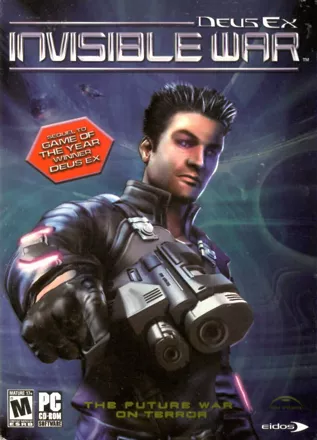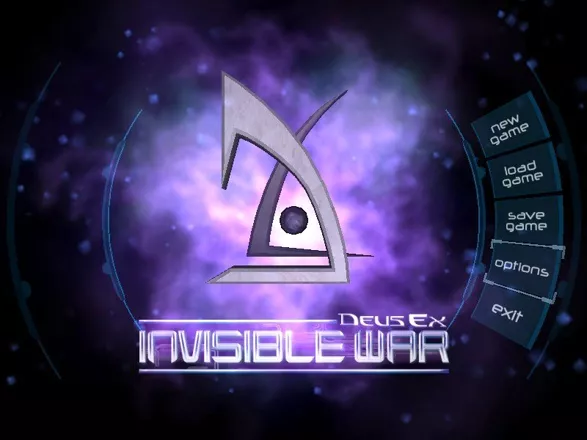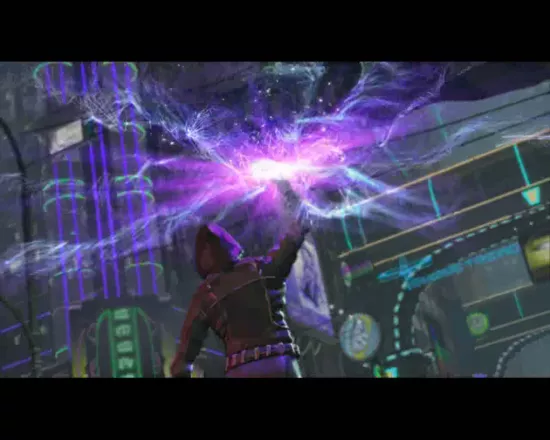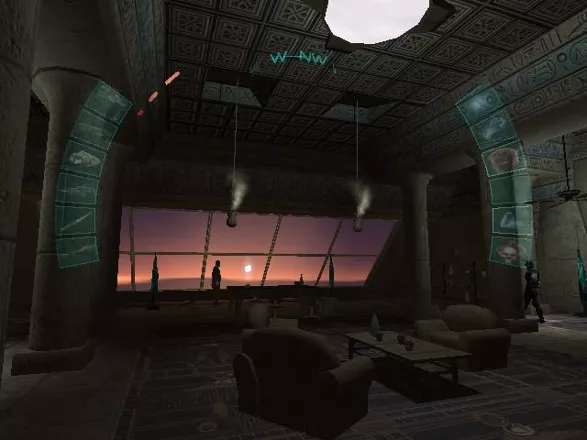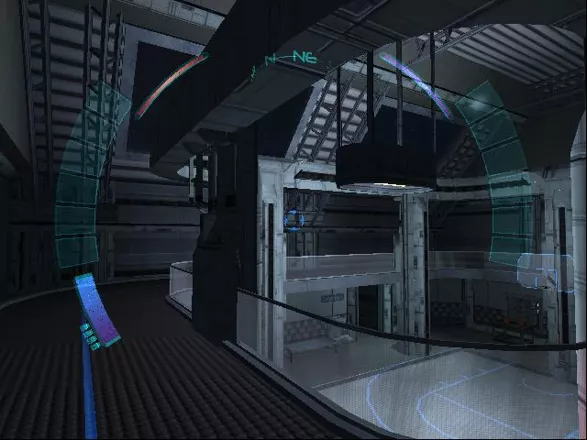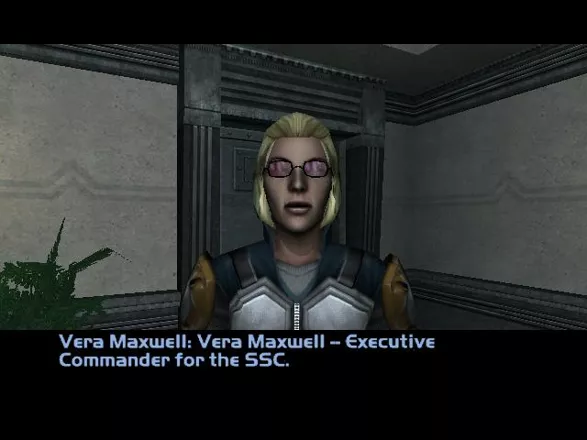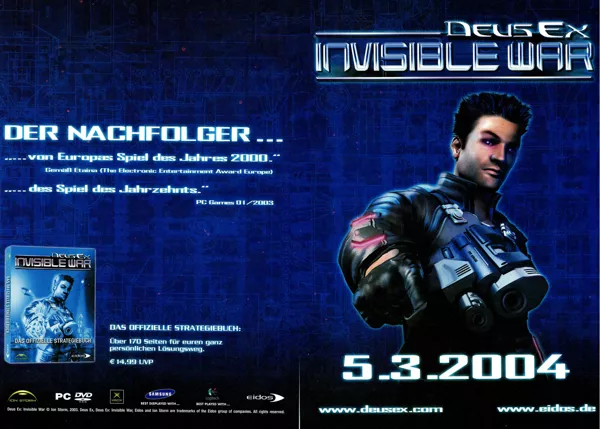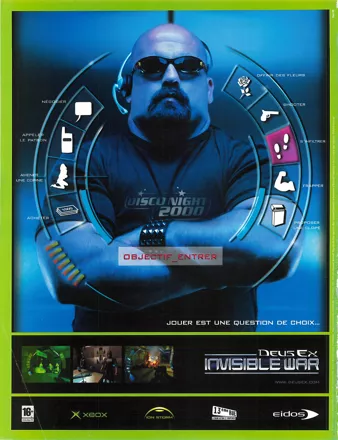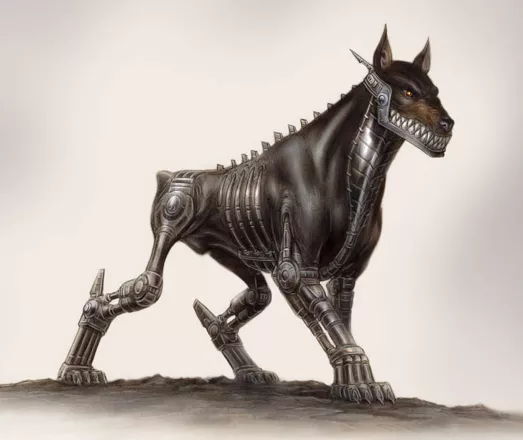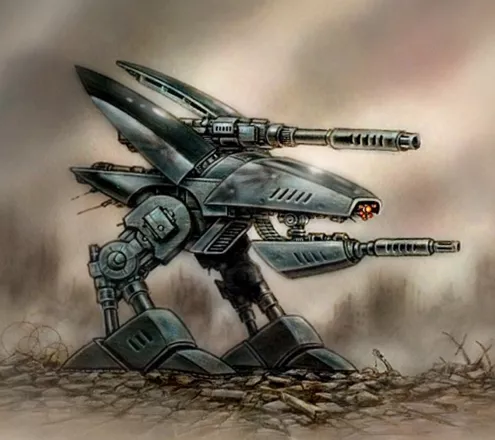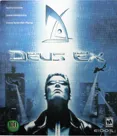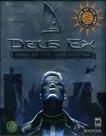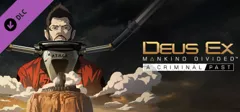Deus Ex: Invisible War
Description official descriptions
Twenty years have passed after the events described in Deus Ex. The actions of JC Denton have eventually led to a period of economic depression, known as "The Collapse". The world is on the brink of chaos after the dismantling of the mighty biotech corporations, and multiple religious and political groups lust after power.
The city of Chicago is destroyed in a devastating energy blast by unknown terrorists. Two trainees of the Tarsus Academy, Alex D and Billie Adams, are evacuated to another Tarsus-controlled facility in Seattle. Shortly thereafter the facility is attacked by members of a religious organization called the Order. Billie admits that she has been collaborating with them, implying that Tarsus may be involved in a conspiracy. It is now up to Alex to find his or her place in the new world, and ultimately shape its fate.
Deus Ex: Invisible War is a first-person shooter that retains many gameplay elements of its predecessor, such as conversations with characters, inventory management, exploration, and mixing various gameplay styles during missions. As in the original game, the style of play helps shape the game as it progresses, from how characters interact with the protagonist to the types of situations encountered. Each potential conflict can be resolved in a number of ways, through peaceful means or through violence, using stealth or a show of force. Hacking computer terminals and unlocking doors with special tools are prominently featured.
Weapons can be modified in a variety of ways, e.g. increasing their rate of fire, silencing the shots, allowing the weapon to shoot through glass, etc. Characters can once again outfit their bodies with an array of biotech parts, some of which include the ability to see through walls, disappear from radar, regenerate from critical hits, or jump forty feet in the air. Unlike the previous installment, there are no true role-playing elements in the game. The player must search for biotech canisters to install and upgrade biomods; however, no experience points are awarded for either completing missions or dealing with enemies. Inventory management has been simplified as well.
The sequel places more emphasis on decisions and different approaches to missions. From the beginning of the game the player has the freedom of performing missions for organizations and people of his or her choice. Like in the first game, several endings can be reached depending on the player's decisions.
Spellings
- 杀出重围:隐形战争 - Simplified Chinese spelling
- 駭客入侵 - Traditional Chinese spelling
Groups +
- 3D Engine: Unreal Engine 2
- Console Generation Exclusives: Xbox
- Deus Ex series
- Gameplay feature: Multiple endings
- Games with 451
- Green Pepper releases
- Middleware: Bink Video
- Middleware: FaceFX
- PC Gamer Presents games
- Physics Engine: Havok
- Protagonist: Cyborg
- Protagonist: Female (option)
- Setting: Arctic / North Pole
- Setting: City - Cairo
- Setting: City - Chicago
- Setting: City - New York
- Setting: City - Seattle
- Software Pyramide releases
- Theme: Hacking / Pseudohacking
- Theme: School
Screenshots
Promos
Videos
Add Trailer or Gameplay Video +1 point
See any errors or missing info for this game?
You can submit a correction, contribute trivia, add to a game group, add a related site or alternate title.
Credits (Windows version)
276 People (233 developers, 43 thanks) · View all
| Studio Director | |
| Project Director | |
| Executive Producer | |
| Producer | |
| Associate Producer | |
| Lead Programmer | |
| Programmers | |
| Additional Programming | |
| Director of Technology | |
| Lead Technology Programmer | |
| [ full credits ] | |
Reviews
Critics
Average score: 79% (based on 64 ratings)
Players
Average score: 3.4 out of 5 (based on 152 ratings with 16 reviews)
The Good
After the global Collapse, the WTO established safe enclaves for the best and brightest citizens of the world. In these enclaves commercialism flourishes. WTO troops and private sector security forces guard commercial and housing districts, while corporations have free reign to raise and educate their future employees. But all is not well. The Order Church have stepped up their anti-WTO activities. Chicago is decimated by a nanotech bomb, an Arcologist compound in Cairo is under siege, and the Panzerwerks factories are crippled by saboteurs. And lurking in the background is the revitalized Knights Templar, whose neo-luddite rhetoric has taken on religious fervor.
Deus Ex: The Invisible War begins with an Order raid on a Tarsus Academy in Seattle. The player’s character, Alex D—a Tarsus student, finds him- or herself under fire and unable to trust the WTO structure he’s been raised in. While the Order is clearly in the wrong, events suggest that Tarsus had ulterior motives regarding his education. Alex finds himself pulled between the WTO and the Order, with both sides recruiting his friends and attempting to sway his opinion. Starting in Upper Seattle, the player is quickly immersed in the gray morality that is the world of Deus Ex.
Invisible War is an action RPG presented from an FPS perspective. The game presents the player with a series of choices in terms of quests and goals. The choices are often conflicting and usually weigh a stack of credits against Alex’s code of ethics. The owner of a nightclub will want someone killed but the mark could double your money. Killing a fighting greasel might improve your gambling luck. Small choices lack the larger repercussions found in the original game, but you can cater to the several factions vying for your favor.
While much of the game can be played over the barrel of the gun, stealthy players can complete the game with few, if any, kills. Like its predecessor, Invisible War is customizable. Through the use of legal and black market biomods, players can upgrade their character, concentrating on creating a covert ops hacker or a killing machine. Basic upgrades allow for health regeneration, increased strength, and increased speed. Illegal modifications let players hack ATMs, take control of security turrets, and drain life from unconscious enemies.
Invisible War doesn’t have to be combat intensive, but there is a decent amount of weaponry to be found. Ranged weapons include the typical lethal pistols, sniper rifles, and rocket launchers. A poisoned dart boltcaster can knock out opponents from a distance. You can get up close and personal with a combat knife, energy sword, or various baton types. There is also a wide array of explosives for various user needs.
Of note, all projectile weapons draw from the same ammunition pool, but at a different rate. So you might not be able to send any more rockets flying at a Templar in full armor, but you can switch over to the pistol and fire off a few more rounds. Weapons can also be modified, but can only take two upgrades and can’t be downgraded if you change your mind.
The world of Deus Ex is still populated with interesting characters, some of whom return from the original game. The world is littered with books and datacubes, coming nowhere near Morrowind’s word count, but still filling in the gaps and explaining things like why all guns take the same ammunition. This entry has fewer locations than the original (and smaller levels), but there is still a bit of globetrotting to be done.
The Bad
Invisible War, aside from its weaknesses as a Deus Ex game, is a fun, largely open-ended excursion. Its ten hour playtime doesn’t provide enough time to develop characters or explore the storyline and players just coming to the franchise might prefer if characters just shut up rather than droning on about myriad conspiracies and organizations. Still there’s a lot to like here.
Most of what I didn’t like involved design choices. The HUD is clunky and crowded. Resembling an iris, good chunks of Alex’s peripheral vision are taken up with inventory and biomod information. You still have to enter an inventory screen to manage inventory, so it really isn’t time saving—especially since you can use the scroll wheel to move through active inventory items.
Levels look similar regardless of where they are geographically. I guess the proliferation of WTO technology is part of the problem, but I was really dying for something organic towards the game’s end.
Finally, aside from a rendered opening and four rendered endings, nothing happens outside of a game level—i.e., taking a helicopter from Cairo to Trier means clicking on a helicopter in Cairo and then magically showing up in Trier. A few transitional scenes would have been nice.
The Bottom Line
There’s an interesting conspiracy theory that Invisible War is smaller, simpler, and shorter than the original in an effort to make it more console-friendly. I’m not sure I buy it, but you have to wonder: in an age when sequels are bigger and better, why is Invisible War so scaled-down?
Let me step back, when I first played Deus Ex I was singularly unimpressed. As a first-person shooter, it was just average and lacked any sort of robust AI. As a first-person sneaker, I much preferred the Thief series. What I liked on my first play through, was the amount of character customization and the conversation options. And the fact that I had choices to make. Choices that seemed to matter.
The second time I played Deus Ex, I realized how brilliant the game was. Based on the choices your character makes, killing Anna early on or saving Paul, the game feels completely different. There’s an incredible level of branching, which I missed the first time out.
Back to Invisible War, I’m not sure that anything I did, up until the last half hour of gameplay, had any real effect. It’s that last half hour that determines which of the four endings you’ll get. Unfortunately, the previous 9-1/2 hours haven’t directed you towards any particular outcome. Are the Illuminati better than the Templars? Is the WTO’s vision of utopia more convincing than ApostleCorps’? Does any of it really matter?
Windows · by Terrence Bosky (5397) · 2005
The Good
The Bad
The Bottom Line
The original Deus Ex threw the first person genre into a loop, rather than conforming to established methods, it combined role playing, stealth, shooting, and adventure gaming into one neat little package. It had a very cool story which dealt with government conspiracies and changed around as you played. It was one of the few true "choice" systems that actually managed to conform to your playing style and keep you fully immersed rather than asking you to make a junction with a limited choice set.
I missed out on much of the last generation of gaming, but I did play Deus Ex and I loved it. Yet everyone kept telling me how terrible Invisible War was, but regardless I wanted to at least play it. And I have to ask... why all the hate? No, its not the sequel it could have been, but its still a very cool game with a heavy adventure element.
The story takes place 20 years after the events of the first game. After the destruction of Area 51 and the death of the man in charge of the Majestic 12, the world's government falls to pieces and leaves the world in an economic depression known as the collapse. Like in the first game, terrorism is seemingly common place now, no one is truly safe and no one is truly trustworthy. Global fear and panic naturally ensues.
Meanwhile, the augmentation project from the first game has taken a step up, able to genetically alter humans. This too causes unrest, people afraid of what an augmented human can truly do when the sky is practically the limit. The game begins with a terrorist attack on Chicago, and focuses on a corporation known as Tarsus. Relocating to Seattle, you are young Tarsus Academy student Alex D. Even there you are not safe as the Tarsus Academy is attacked, but the veil is slowly lifted when Tarsus is truly treating its students as lab rats for even further human augmentation and breeding genetic soldiers. This is where the game leaves you with the questions and as you progress, the story will take you for many twists and turns, much like its predecessor.
It also helps the story that the developers have expanded the games universe more. Although some things seem a little too high tech for a global depression, it does have a nice art design and there are many new facets of the series' universe which make it a richer and more diverse one. The story is a little easier to follow than its predecessor, even if it doesn't carry the same impact. My biggest flaw with the story here is that a plot point the game treats like a twist later on is made obvious right at the start. Your characters name is Alex D. What "D" stands for is a little too obvious to anyone who has played the first title.
The gameplay from its predecessor is largely intact, save for one element. While the Stealth, exploration, and shooting are all here in pristine condition the RPG elements have wandered off somewhere and are rarely heard from. You do not gain experience or skills, augmentation canisters are more common and save for black market or "professional" mods, they let you pick any augmentation you want right off the bat rather than having each augmentation canister have a unique trait. Upgrade canisters are gone as well, with upgrades available with each augmentation canister. The game also takes away your notes and makes keypads and other such devices instant use, provided you found that datacube. This does fracture the immersion some, and while the game is still highly immersive, it will not keep you glued to your chair as long as its predecessor due to this.
The dumbed down RPG elements are the weakest element of Invisible War and I too, was pissed at first and ready to condemn it like most other fans of the first game. But don't be so quick to condemn it, once you simmer down and have explored the world a bit, you will be hooked. At least I was. Once again, an important element of what made the first game unique shows up here: Exploration and adventure. They did not dumb this element down, and exploring the rich world is just as rewarding as it ever was. The adventure elements, like its predecessor, actually conform to your gameplay style rather than providing simple junctions like most games with a "choice" element. Granted, there are some exceptions here where you do make crucial choices from a tree, but they only open up separate possibilities and this element is really just to choose which faction to side with. The game will still evolve as you play, which keeps it a replayable and fresh experience.
The graphics, like its predecessor, are... well, "Meh." The Unreal 2.0 engine is used this time, and similar to how the first game failed to use the power of the first Unreal engine, this game doesn't make use of its powerful engine. Characters have creepy faces that stare with an occasional sprite blinking for them and they animate minimally. Textures are extremely low resolution. About the only thing the graphics really have going for them are some terrific lighting effects. The lighting is great and shadowing is realistic. Apparently the lower res graphics/textures were used to facilitate the Xbox, but that is not an excuse. Doom 3 had an engine tailored for the PC and the Xbox, but the PC version still took advantage of any extra hardware.
Another problem with the graphics are the framerates. Due to some very sloppy code, the game has performance issues up the butt. Sometimes, even on a modern computer, the framerate can dive and jitter. The games simplistic system requirements are misleading, and when I first bought it I was going to install it on the laptop I bought 2 years ago and play it on a roadtrip, and despite that Laptop being able to play some notorious system hogs such as S.T.A.L.K.E.R., but with the shadowing on the game ran at an unplayable 6 frames per second and with those effects off, 14 was an improvement but still pathetic.
I didn't have too much problem running it on my Desktop, but there were still dives and jitters and apparently everyone had these problems. Its one thing to neglect visual detail to facilitate a console, but you shouldn't neglect solid coding to facilitate a console instead.
Regardless, the game world is still highly immersive and fun to explore and will take you to many locales through the course of its story. The game is noticeably shorter than the first game, whereas the first game could take a solid 28+ hours to complete, Invisible War clocks in around 18. Granted, that's not bad and there is so much to see and do that that number would be higher if I were including side quests and such, I am only focusing on a dry run of the main plot length to gauge that number.
The music is really cool. Like its predecessor, the sound has a techno-ish vibe that fits the Cyberpunk style like a glove. There are lots of cool highlights, and the game also has one of the best fictional artists I've heard in awhile. What I mean by this is that there is a female techno/pop rock artist who exists solely in the games universe, but her music appears in the game universe and it ain't half bad. I'll admit that I pretended to dance to one of her tunes at the club where you first hear them. Granted that style of music may not be for everyone, but I certainly dug it.
The games shooting elements are base, but they work and can be expanded. You can still modify your guns, and the modification is a bit more balanced this time. In the first game, I had a pistol with a scope, 5 accuracy upgrades, 2 clip upgrades, a laser sight, a silencer and armour piercing bullets. Although it was kinda cool crafting a unique pistol through the upgrades, that pistol was overpowered as hell. About the only other fictional handgun I can think of that could beat that pistol is Dirty Harry's infamously awesome .44 Magnum. Here, each weapon can only hold two weapon mods. This keeps them a bit more balanced and the action a bit more even, along with the fact that this game is a little more forgiving at times then its predecessors. You won't turn into a bloody block of Swiss cheese within the first 5 minutes like you did last time.
The weapon mods are also a bit more diverse and offer a wider variety of changes. Some are rarer and have unique effects, such as glass destabilization, which can actually melt glass. I had a pistol with that mod and a standard silencer mod and it was perfect for silent take downs as well as robberies. I do have to admit, it was fun, one time I snuck into someones home to rob them and rather than kill them, just knocked them out and I was thinking "What if he wakes up and hits that alarm?" and I noticed a ventilation shaft above the room and tossed his body there and shut it. Later I heard footsteps, and he was standing in the vent running towards the alarm but obviously couldn't get out. I also got a pretty nifty energy sword out of this with m handy glass destabilization mod.
Shooting this time also uses a unified ammo system, which is efficient, though it does have its con. You never have to reload per se and you never have to worry about a gun taking 3 hours to reload like some of the ones in the first game. Every weapon in your arsenal uses this ammo, although some drain more ammo than others. As I said, it is an efficient system that keeps the action fast paced. Its biggest con is that you don't get alternate ammo types in their proper form. Here, they take the form of weapon mods, meaning you can't switch between them once you've modded a weapon with the alternate ammo and I often feel its a waste of a weapons' modification slot.
As a whole, Invisible War is, in my mind, heavily underrated. I understand that more often than not, video game sequels are arguably the only form of sequels that can be better than their predecessors, but I do not understand why one slightly inferior sequel should be condemned when what content is here is in top shape. I had a lot of fun and loved the story, characters, universe, and gameplay. Isn't fun the primary objective of a game? To each their own, but I recommend Invisible War to fans of shooters, stealth em' ups and adventure fans; and I wish for Deus Ex fans to give this one another chance with a clear mind.
Windows · by Kaddy B. (777) · 2010
The Good
The story has a lot of twists, the graphics are very atmospheric, the biomod upgrade system adds a lot of strategy and depth to the game, the speech is great, the gameplay is non-linear.
The Bad
Most of the models have been heavily reused through the game, the story has more twists than required, You can't use more than 6 different upgrades at a time.
The Bottom Line
Deus Ex 2 is simply a breathtaking joyride through a dark world of corruption, lies, heroes and demons, with a lot of story twists.
You start as Alex D. (either male or female depending on Your choice at the beginning of the game) and are about to uncover that the fate of the world is not decided by the people, but by 4 groups which have different interests and aims, and You are just a puppet in a big conspiracy game....
Since this is a mixture between roleplaying game, FPS, adventure, You have a lot of choices on what You will do and who You will work with.
You meet a lot of friendly or neutral NPCs who will give You jobs, ask for or offer help, want to trade with You, like in any good RPG.
The nice and immersive thing is that You can accept jobs from different parties resulting in changes of how the story evolves.
Sometimes You are told to kill someone by one fraction and ordered to save him by another...
There's also quite a nice variety of real-world weapons, like flamethrowers, missile launchers, knifes, swords etc.
Besides that, there is the biomodification system, that offers You slots (body parts) to be "enhanced": You can modify the brains (to hack computer systems via a neural port), the eyes (better sight, remote control killer drones...), the body itself (becoming invisible...), the legs (faster, higher jumps, safe landing from high altitude, sneaking...),
the arms (more strength, built-in bioweapons...)....
In each slot, You can only have one modification, but the choice between three different ones (including mods called "illegal").
The best part is that You can play Deus Ex 2 the way You want.Each problem can be solved in different ways, You can infiltrate buildings via the ventilation system, by using "multitools" (a kind of digital lockpick key set), by using a weapon (missile launcher), by getting a code card....that code card could be obtained through a dialogue, by stealing it, by finding it in a chest....it happened to me to actually reload the game several times to try different approaches, and in almost any situation, You can find a non-violent way to solve a problem.
There's always the option to fight Your enemies with bio-toxine which will render them unconscious, instead of having to kill them.
Or, like in Splintercell, You can just try to sneak by (using Your biomods to become invisible for as long as the bio-battery holds...).
Plus, there's multiple ways to combine Your bio-modifications, so at the end of the day, Deus Ex 2 offers a tremendous amount of non-linear ways to play the game and experience it YOUR way, and it has real lastability, because You would find new ways to play it even when playing it for the third or fourth time.
Add to that the four different endings depending for which party You eventually finish the game, and You have another classic game made by the awesome folks at Ion Storm.
Windows · by Emmanuel Henne (23) · 2005
Discussion
| Subject | By | Date |
|---|---|---|
| It's not that bad! | Unicorn Lynx (181780) | Sep 15, 2011 |
| Screenshots | Cantillon (76856) | Sep 8, 2011 |
| Dynamic Lighting | St. Martyne (3648) | Nov 15, 2008 |
Trivia
Basketball
Continuing the Warren Spector tradition, Invisible War features a basketball court. It's right at the beginning of the game and there's no missing it; one of your mandatory objectives will send you through there.
Engine
Ion Storm licensed the Unreal engine and heavily modified it for this game. Its a inhouse engine with a tiny bit of Epic's Unreal code left in. It is said that the engine programmer left mid-development with a largely undocumented code which caused the game's numerous technical problems.
Music
In order to bring popstar NG Resonance's music to life, Eidos licensed a few tracks from the industrial/techno band "Kidney Thieves". Said tracks can be found in their Trickstereprocess album. The original soundtrack for the game on the other hand, can be downloaded for free on Eidos's site.
References
The coffee shops, Pequod's, and QueeQueg's are from Moby Dick. The Pequod, was the name of the ship. QueeQueg is the Indian harpooner.* In the abandoned curio shop over the 9 World Taverns, you can find a book containing text on the care and cleaning of Ohio State Bobbleheads. Chris Carollo, the lead programmer for Invisible War is an Ohio State alumni. * The Tarsus Academy shares a name with the city that was the birthplace of Paul, the apostle. Paul Denton acts as the apostle for J.C. Denton.
Awards
- 4Players
- 2004 – Best Console Story of the Year
- GameSpy
- 2003 – #7 Game of the Year
- 2003 – #3 Xbox Game of the Year
- 2003 – #5 PC Game of the Year
- GameStar (Germany)
- Issue 04/2009 - One of the "10 Most Terrible Sequels" (It is a good game in its own right but it changes everything which made Deus Ex big for the worse, e.g. exciting story, clever level design, RPG elements and freedom of decision.)
Information also contributed by MasterMegid, Scott Monster and Zovni
Analytics
Upgrade to MobyPro to view research rankings!
Related Sites +
-
Deus Ex 2
Official Web Site -
Deus Ex: Invisible War Post-Mortem
Warren Spector and Harvey Smith speak about the development and shortcomings of Deus Ex: Invisible War (Youtube) -
Hi-Res Textures for Deus Ex: Invisible War
Download a pack containing hi-res replacement textures for the game. -
Kidney Thieves official site
Site of the industrial/techno band Kidney Thieves, who contributed to Invisible War's soundtrack.
Identifiers +
Contribute
Are you familiar with this game? Help document and preserve this entry in video game history! If your contribution is approved, you will earn points and be credited as a contributor.
Contributors to this Entry
Game added by Jeanne.
Xbox added by Jason Walker.
Additional contributors: xroox, Zovni, Unicorn Lynx, Shoddyan, Paulus18950, Patrick Bregger.
Game added December 6, 2003. Last modified March 19, 2024.
